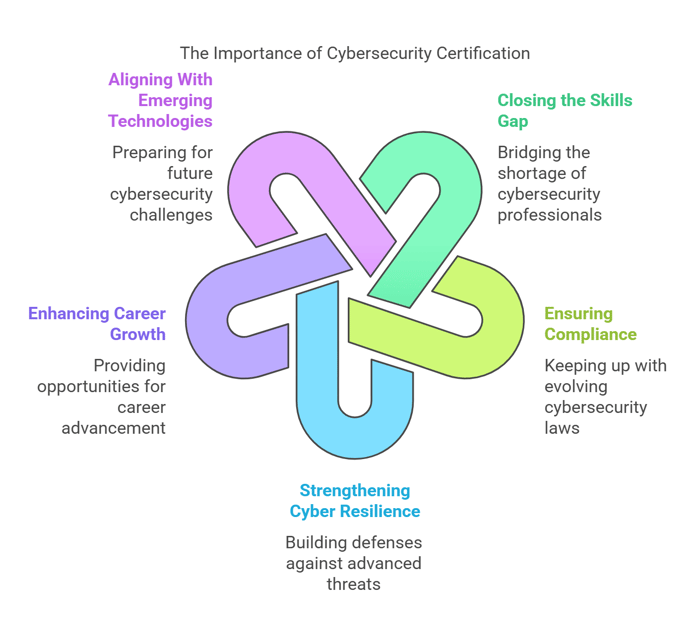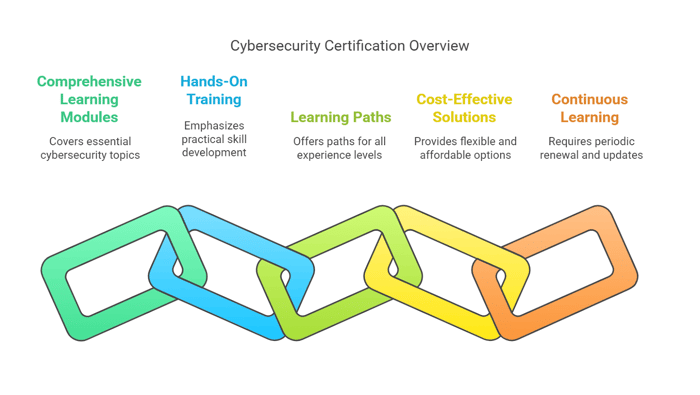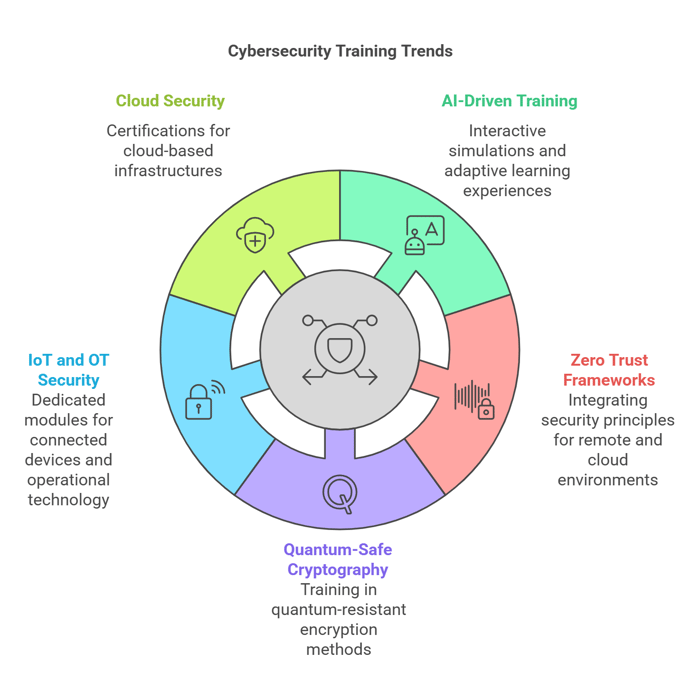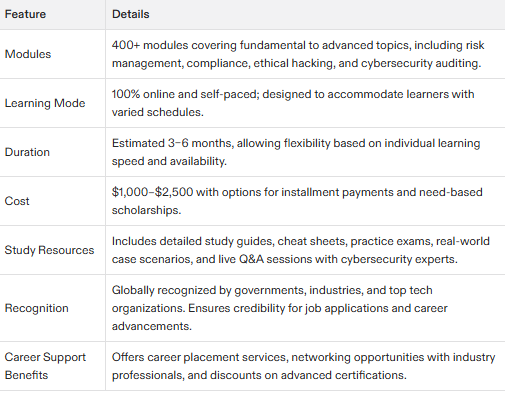Table of Contents
- Why Cybersecurity Workforce Certification Training Matters
- Core Features of Cybersecurity Workforce Certification Training
- Popular Cybersecurity Certifications in 2025
- Future Trends in Cybersecurity Workforce Training
- Benefits of Structured Cybersecurity Certification Training
- Final Thoughts
- FAQs About Cybersecurity Workforce Certification Training
- 1. What is cybersecurity workforce certification training?
- 2. Why are certifications important for cybersecurity professionals?
- 3. How often do cybersecurity certifications require renewal?
- 4. Which cybersecurity certification is best for beginners?
- 5. What are the highest-paying cybersecurity certifications?
- 6. How long does it take to earn a cybersecurity certification?
- 7. Are online cybersecurity certification courses effective?
- 8. What industries require cybersecurity certifications?
The digital age has unlocked countless opportunities, but it has also led to a sharp rise in cyber threats. Businesses, governments, and individuals are constantly at risk from hacking, data breaches, and ransomware attacks. To counter these growing threats, the Workforce Certification Training Program in cybersecurity has become essential. It equips professionals with the skills, knowledge, and credentials to safeguard digital assets effectively.
By 2025, the demand for cybersecurity professionals is expected to outpace supply, making the Workforce Certification Training Program an essential investment for career growth. This guide delves into the importance of the Cybersecurity Workforce Certification Training Program, its benefits, key certifications, and industry trends shaping the future.
Why Cybersecurity Workforce Certification Training Matters
Certification training ensures professionals stay updated on evolving cyber threats and security practices. It provides hands-on experience, validates expertise, and enhances job prospects. As cyber threats grow, certified professionals are essential to protecting critical digital infrastructures.

1. Closing the Cybersecurity Skills Gap
The shortage of skilled cybersecurity professionals remains a critical issue. Certification programs provide structured training that helps bridge this gap by turning learners into job-ready experts.
2. Ensuring Compliance With Regulations
Cybersecurity laws and compliance requirements are evolving rapidly. Certifications like CISSP, CISM, and GDPR compliance training ensure professionals stay updated with regulatory requirements in 2025.
3. Strengthening Cyber Resilience
Organizations are prioritizing cyber resilience to counter AI-driven attacks, zero-day vulnerabilities, and sophisticated ransomware. Certified professionals play a crucial role in implementing robust security strategies.
4. Enhancing Career Growth Opportunities
Cybersecurity certifications open doors to higher salaries, leadership roles, and global job opportunities. Employers seek certified professionals to handle specialized security operations.
5. Aligning With Emerging Technologies
With advancements in AI, quantum computing, and IoT security, certification programs now include modules on next-gen cybersecurity techniques, making professionals future-ready.
Core Features of Cybersecurity Workforce Certification Training
Certification programs, such as Cybersecurity Certification Names, provide structured modules covering risk management, ethical hacking, and compliance. They include hands-on simulations, accommodate all experience levels, and ensure cost-effective learning with periodic recertification to stay updated.

1. Comprehensive Learning Modules
Modern certification programs cover essential topics such as risk management, cloud security, ethical hacking, and AI-driven threat analysis. Some certifications, like ACSMI, offer 400+ modules to ensure thorough knowledge.
2. Hands-On Training and Simulations
Theoretical knowledge alone is not enough. Certifications now emphasize real-world attack simulations, penetration testing labs, and incident response exercises to enhance practical skills.
3. Beginner to Advanced Learning Paths
Programs cater to different experience levels:
Beginner: CompTIA Security+, Cisco CCNA Cyber Ops
Intermediate: CEH, OSCP, CySA+
Advanced: CISSP, CISM, ACSMI
4. Cost-Effective Learning Solutions
Online training platforms provide cost-efficient certification programs with flexible schedules, allowing professionals to upskill without disrupting their careers.
5. Continuous Learning and Recertification
With cyber threats evolving, many certifications require periodic renewal through Continuing Professional Education (CPE) credits or updated exams.
Popular Cybersecurity Certifications in 2025
Certifications help professionals specialize in various cybersecurity domains. Entry-level options include CompTIA Security+ and CCNA Cyber Ops, while intermediate certifications like CEH and OSCP focus on penetration testing. Advanced certifications such as CISSP, CISM, and ACSMI prepare experts for leadership roles. If you're looking to add some humor to your journey, check out the Cybersecurity Certification Meme, which highlights the often chaotic, but rewarding, world of cybersecurity certification.
Beginner Level Certifications
For those entering the cybersecurity field, these certifications provide a strong foundation.
CompTIA Security+ – Covers core security concepts and best practices.
Cisco CCNA Cyber Ops – Focuses on network security and operations.
Intermediate Level Certifications
Ideal for professionals looking to specialize in penetration testing, incident response, or compliance.
Certified Ethical Hacker (CEH) – Trains professionals in ethical hacking techniques.
Offensive Security Certified Professional (OSCP) – Provides hands-on penetration testing skills.
Cybersecurity Analyst (CySA+) – Focuses on threat detection and risk analysis.
Advanced Level Certifications
For professionals aiming for leadership roles in cybersecurity governance and enterprise security.
Certified Information Systems Security Professional (CISSP) – Covers security architecture and governance.
Certified Information Security Manager (CISM) – Focuses on risk management and compliance.
ACSMI Certification – Offers comprehensive training on technical and strategic cybersecurity aspects.
Future Trends in Cybersecurity Workforce Training
Cybersecurity training evolves with AI-driven simulations, zero-trust frameworks, and quantum-safe cryptography. Cybersecurity Certification Mindmap now includes IoT and OT security, ensuring professionals stay prepared for next-gen cyber threats. Cloud security training is also gaining importance with the shift to hybrid environments.

1. AI-Driven Cybersecurity Training
AI-powered tools are transforming cybersecurity training, offering interactive threat simulations and adaptive learning experiences.
2. Focus on Zero Trust Security Frameworks
With remote work and cloud adoption rising, certifications are integrating Zero Trust security principles to mitigate risks.
3. Quantum-Safe Cryptography Training
As quantum computing evolves, professionals need training in quantum-resistant encryption methods to secure digital assets.
4. Specialized IoT and OT Security Training
With the growing number of connected devices, certifications now include dedicated IoT and Operational Technology (OT) security modules.
5. Cybersecurity for Cloud and Hybrid Environments
Cloud security certifications such as AWS Security Specialty and Google Professional Cloud Security Engineer are gaining traction as businesses migrate to cloud-based infrastructures.
Benefits of Structured Cybersecurity Certification Training
Structured certification training enhances career growth, provides global recognition, and increases earning potential. It equips professionals with the latest skills to handle cyber threats effectively and connects them with industry experts through professional communities.
1. Tailored Career Development
A structured learning path allows individuals to progress from foundational concepts to advanced security techniques without gaps.
2. Global Recognition and Industry Validation
Globally recognized certifications help professionals gain credibility and expand career opportunities worldwide.
3. Increased Earning Potential
Certified cybersecurity professionals earn 20-40% more than their non-certified peers due to high demand and specialized skills.
4. Ability to Handle Advanced Cyber Threats
Structured training prepares professionals to mitigate AI-driven cyber threats, ransomware, and advanced persistent threats (APTs).
5. Access to Professional Communities
Many certifications provide access to exclusive cybersecurity forums, networking groups, and mentorship opportunities.
Final Thoughts
Cybersecurity workforce certification training is more crucial than ever as digital threats continue to grow in complexity. By obtaining industry-recognized certifications, professionals can enhance their expertise, secure high-paying roles, and contribute to a safer digital world. Programs like CISSP, CEH, OSCP, and ACSMI prepare individuals to tackle modern cyber threats while ensuring compliance with evolving regulations.
As cybersecurity evolves in 2025 and beyond, staying ahead with certifications will remain an indispensable strategy for career growth and digital defense.
FAQs About Cybersecurity Workforce Certification Training
1. What is cybersecurity workforce certification training?
It is a structured educational program that equips cybersecurity professionals with technical skills, industry knowledge, and credentials to excel in their careers.
2. Why are certifications important for cybersecurity professionals?
Certifications validate expertise, provide credibility, and help professionals advance in their careers by demonstrating their ability to tackle evolving cyber threats.
3. How often do cybersecurity certifications require renewal?
Most certifications, including CISSP and ACSMI, require renewal every 2-3 years through continued education credits or recertification exams.
4. Which cybersecurity certification is best for beginners?
CompTIA Security+ is an ideal starting point for beginners as it covers fundamental cybersecurity concepts and best practices.
5. What are the highest-paying cybersecurity certifications?
Certifications like CISSP, CISM, and OSCP offer lucrative career opportunities due to their industry demand and specialized skill sets.
6. How long does it take to earn a cybersecurity certification?
The duration varies depending on the certification level. Entry-level certifications may take a few months, while advanced certifications require 6-12 months of study and experience.
7. Are online cybersecurity certification courses effective?
Yes, many reputable institutions offer hands-on labs, real-world simulations, and mentorship programs that make online training as effective as traditional classroom learning.
8. What industries require cybersecurity certifications?
Industries such as finance, healthcare, government, defense, and technology heavily rely on certified cybersecurity professionals to secure sensitive data and infrastructure





